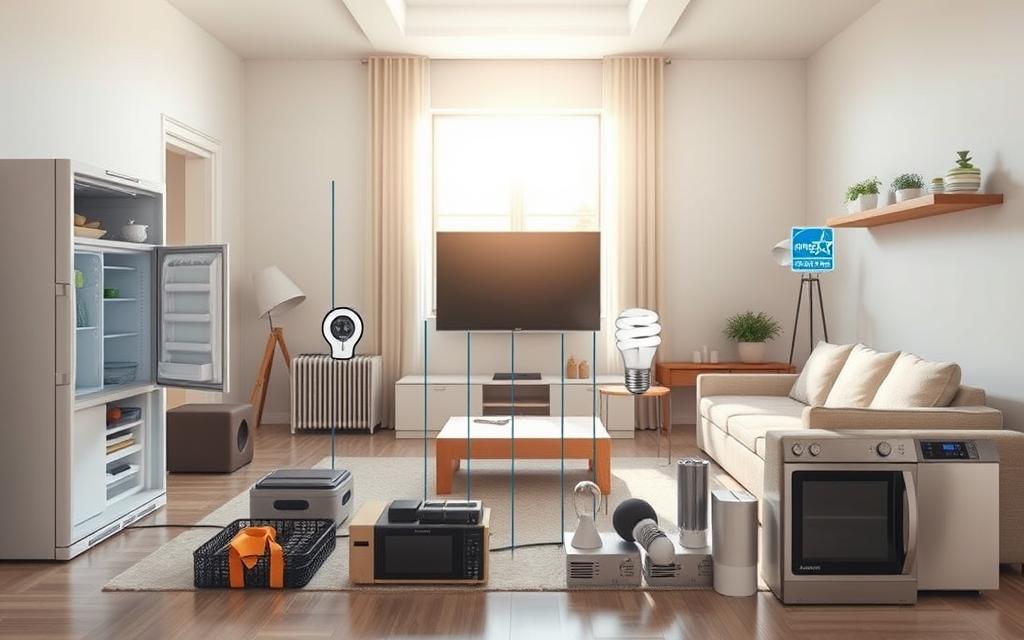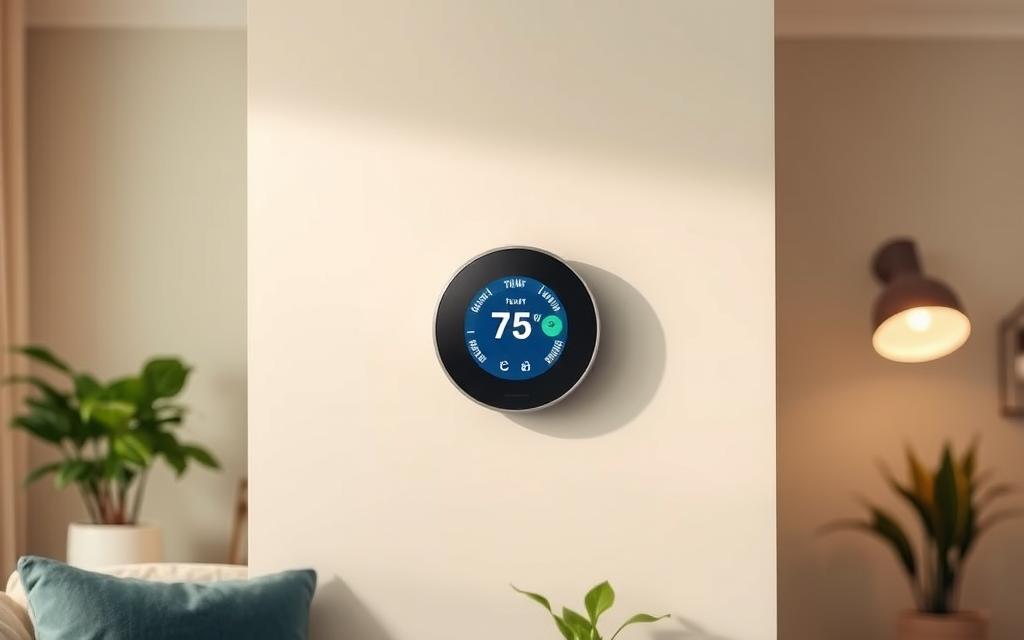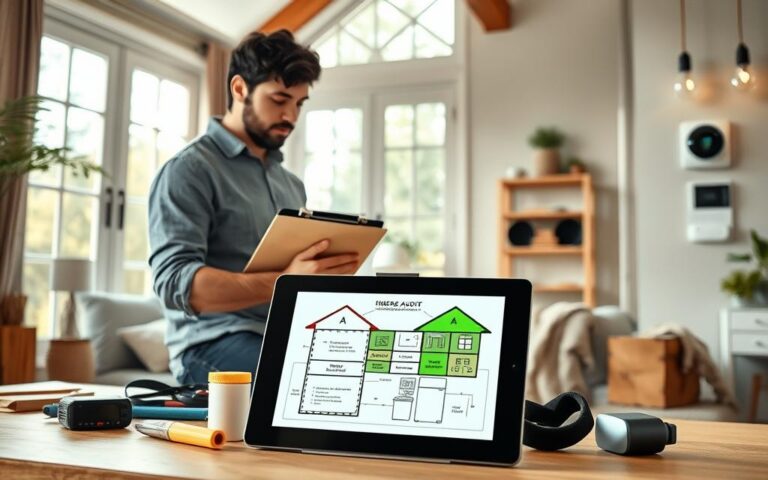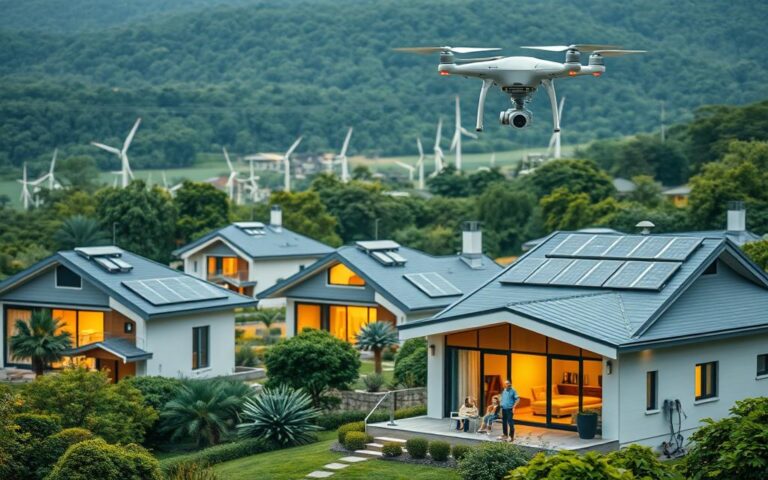Did you know that homes can save up to £356 a year in Great Britain and £416 in Northern Ireland? This is by using energy-saving tips. Smart thermometers help by automating heating and cooling. They make your home comfortable all year.
Using this technology saves a lot on bills and helps the planet. Homeowners save money and live more sustainably. They keep their homes cozy and eco-friendly.
What Are Energy-Saving Tips?
Energy-saving tips are actions and habits to cut down on energy use. They can be small daily changes or big investments in home tech.
Overview of Energy-Efficient Practices
Energy-efficient practices make homes more comfortable and help the planet. Here are some examples:
- Switch to LED bulbs instead of incandescent ones
- Turn off devices when not in use
- Get smart thermostats for better heating and cooling
- Use natural light as much as you can
- Choose appliances with high Energy Star ratings
Benefits of Energy-Saving Measures
Energy-saving tips do more than save money. They also:
- Lower energy costs over time
- Help the environment by reducing carbon footprint
- Make your home more valuable
- Improve comfort in your living space
How Energy-Saving Tips Work
Energy-saving tips help you understand how and when you use energy at home. By looking at your energy use, you can start using less. This can make your bills lower and keep your home comfortable all year.
Understanding Energy Consumption Patterns
Energy use in homes comes from daily habits. Watching how you use appliances and adjusting your heating and cooling can help. Small changes like using appliances when it’s cheaper, lowering your thermostat, or opening windows can save a lot of energy.
Assessing Home Energy Efficiency
Checking your home’s energy use is key to saving energy. Look for places where energy leaks out, like drafty windows or bad insulation. Fixing these can make your home use less energy. An energy audit can show you exactly where to focus to save the most.
Advantages of Using Energy-Saving Tips
Using energy-saving tips has many benefits. They help save money and protect the environment. By using less energy, you can cut down on your bills.
Cost Savings and Financial Benefits
One big reason to save energy is the money you can save. By using less power, your bills go down. Simple steps like using LED bulbs can save a lot over time.
Environmental Impact
Energy-saving also helps the planet. It cuts down on harmful emissions and saves resources. Making these choices helps keep our planet healthy for the future.
Popular Energy-Saving Devices
Adding energy-saving devices to your home is key for living green. These tools help you and your family use less energy. Two main types are EnergyStar products and smart meters.
EnergyStar Products
EnergyStar products use less energy than regular ones. They include things like appliances, lights, and heating systems. The EPA sets strict standards for them.
Using EnergyStar appliances can cut electricity use by up to 90%. This means big savings on your bills. It’s a step towards a greener lifestyle.
Smart Meters and Energy Monitors
Smart meters and energy monitors show how much energy you use in real time. They track your energy use and help you find ways to use less. This helps you live more sustainably.
With these tools, you can see when you use the most energy. Then, you can change your habits to use less. It’s all about making smart choices for a better planet.
Simple Installation Tips for Energy Solutions
Homeowners looking to save energy can start by installing energy-efficient appliances. Replacing old appliances with EnergyStar-rated ones can cut down on electricity use. This leads to lower utility bills over time.
Installing Energy-Efficient Appliances
When buying new appliances, choose energy-efficient ones. Focus on:
- Refrigerators: Find models that use less energy but still offer plenty of space.
- Washing machines: Go for front-load designs that save water and energy.
- Heating, ventilation, and air conditioning units: Pick high-efficiency systems for better comfort and lower energy use.
Buying these appliances helps save energy and money every month.
DIY Insulation Strategies
DIY insulation can also boost your home’s energy efficiency. Try these simple steps:
- Seal gaps and cracks around windows and doors to stop drafts.
- Add insulation in attics or basements to keep heat in.
- Use insulated curtains to keep warmth in during cold weather.
These changes help keep your home cozy and save on bills. By using these tips, you can save money and help the planet.
Features to Consider When Choosing Energy-Saving Devices
When picking energy-efficient devices, it’s key to see how they fit with what you already have. Knowing if they work well with your systems helps them save more energy. These devices not only cut down on energy use but also make your home work better.
Compatibility with Existing Systems
Before buying an energy-saving device, check if it works with your HVAC and water heating systems. A good match means better performance and saving more energy. Look for devices with clear specs and reviews to see how well they work in real life. Here are some key things to think about:
- Can it connect with your smart home?
- Does it fit your voltage and amperage needs?
- Can it get software updates and upgrades?
Ease of Use and Maintenance
Energy-saving tips are more helpful when devices are easy to use and don’t need much upkeep. Pick products with simple controls for easy use. Also, devices that show energy use can help you track your savings. Here are more good points:
- Do they have clear manuals and online help?
- Do they get regular software updates?
- Is customer service easy to reach for help?
Adding energy-efficient devices to your home helps meet your energy-saving goals. Choosing devices that are easy to use and fit well makes your home more sustainable.
Energy-Saving and Efficiency Standards
Knowing about energy-saving standards is key for homeowners wanting to save energy. Learning about Energy Star certification helps pick products that are energy-efficient. This certification means the products are good for the planet and save money in the long run.
Understanding Energy Star Certification
Energy Star certification means products are tested to use less energy than usual. Products with the Energy Star label meet strict standards. Choosing these products can save a lot of money and help the environment.
Compliance with Local Energy Regulations
Homeowners need to keep up with local energy rules. Following these rules helps the community save energy and might even get you discounts. It’s a way to support a greener future.
Integrating Energy-Saving Solutions into Daily Life
Adding energy-saving steps to our daily routines can really help. Setting clear energy goals is a great start. These goals might be to use less electricity or live more eco-friendly.
Having a clear plan helps everyone in the house work together. This way, we can all help reach our energy-saving targets.
Setting Energy Goals
Setting energy goals helps us keep track of our progress. Families can aim to use less electricity. This could mean using less power during busy times or picking energy-saving items for the home.
Creating a Sustainable Household Culture
Building a sustainable home culture is key. Getting everyone involved in saving energy makes it easier. Simple actions like turning off unused devices or recycling can help a lot.
Working together makes us all feel more responsible. It shows that we can all play a part in saving energy.
Common Misconceptions About Energy-Saving Tips
Many people think wrong about energy-saving tips. These misconceptions can stop them from using energy-efficient practices. Knowing these myths helps manage energy better and lower bills.
Myth: Energy Efficiency Requires Major Investment
Some think saving energy costs a lot of money. But, many tips are cheap or free. Turning off lights or using curtains can save a lot without spending much.
By focusing on these tips, people can help the planet and save money at the same time.
Myth: Energy Savings Are Minimal
Many believe small changes don’t make a big difference. But, even small actions can add up over time. Unplugging devices or adjusting thermostats can really help lower bills.
Every little bit helps in saving energy. It shows that even small efforts can make a big impact.

Troubleshooting Energy-Saving Practices
Fixing energy-saving issues can make homes more efficient. Finding where energy is wasted is key. Appliances are big energy users. Checking how often they’re used can help save energy.
Homeowners should look for better ways to do things. This can cut down on energy use.
Identifying Energy Drains
Old appliances and bad habits can raise energy bills. Using energy meters helps track usage. Turning off unused devices saves a lot of energy.
Also, keeping appliances at the right temperature saves energy. This simple step can make a big difference.
Evaluating Equipment Efficiency
Regular upkeep is important for efficient equipment. Check heating and cooling systems often. Change filters and check insulation.
This ensures systems work well, saving energy. A little maintenance can lead to big savings and comfort.
The Future of Energy Efficiency
The world of energy efficiency is changing fast, thanks to new technologies. Home automation and smart tech are at the forefront. They give us real-time data on energy use, making it easy to save.
For example, smart thermostats from Nest and Ecobee help us use less energy. They adjust based on our daily routines. This leads to better energy habits.
Emerging Technologies in Energy Conservation
Home automation isn’t the only game-changer. Sustainable energy solutions are also making a big impact. Solar and wind power are becoming cheaper and more popular.
As prices drop, more people are turning to these clean energy sources. This move is good for the planet and saves money on bills.
The Shift Towards Renewable Energy Sources
The future looks bright for renewable energy. It’s key to achieving energy independence. The demand for green solutions is rising fast.
By embracing these new technologies, we can help the planet. We also get to enjoy lower energy costs.



